Fleurs du Mal Magazine


Or see the index
This book of poetry is a song for the plight and pride of immigrants around the globe, including the U.S., China, Syria, Honduras, Guatemala, Nepal, Tibet and other places.
 Whether they pull up their roots to flee war, the rising sea or drought, for religious freedom and freedom of speech, or simply to seek a better life, immigrants are the frontiers of civilization.
Whether they pull up their roots to flee war, the rising sea or drought, for religious freedom and freedom of speech, or simply to seek a better life, immigrants are the frontiers of civilization.
They are a force of nature, like salmon, monarchs, trees, water, and mountains, moving with rivers, the earth and universe.
Migration is the signature of life – no immigrants, no economy; no immigration, no civilization; no migration, no life.
We are all immigrants.
Wang Ping is Poet, professor, photographer, installation artist, author of 14 books and dancer.
My Name is Immigrant
by Wang Ping (Author)
Publisher: Hanging Loose Press (May 4, 2020)
Language: English
128 pages
ISBN-10: 1934909661
ISBN-13: 978-1934909669
2020
Paperback
$17.46
• fleursdumal.nl magazine
More in: #Editors Choice Archiv, - Book News, - Bookstores, Archive O-P, Archive O-P
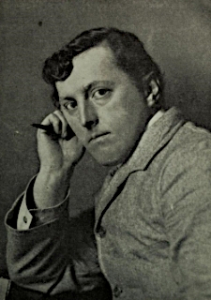
A Dream
My dead love came to me, and said,
‘God gives me one hour’s rest,
To spend with thee on earth again:
How shall we spend it best?’
‘Why, as of old,’ I said; and so
We quarrell’d, as of old:
But, when I turn’d to make my peace,
That one short hour was told.
Stephen Phillips
(1864 – 1915)
A Dream
• fleursdumal.nl magazine
More in: #Editors Choice Archiv, Archive O-P, Archive O-P
Exquisitely sharp, deeply humane and brutally hilarious, Toy Fights is a future classic from one of the greatest writers of his generation.
 This is a book about family, money and music but also about schizophrenia, hell, narcissists, debt and the working class, anger, swearing, drugs, books, football, love, origami, the peculiar insanity of Dundee, sugar, religious mania, the sexual excesses of the Scottish club band scene and, more generally, the lengths we go to not to be bored.
This is a book about family, money and music but also about schizophrenia, hell, narcissists, debt and the working class, anger, swearing, drugs, books, football, love, origami, the peculiar insanity of Dundee, sugar, religious mania, the sexual excesses of the Scottish club band scene and, more generally, the lengths we go to not to be bored.
Don Paterson was born in Dundee, Scotland, in 1963. He spent his boyhood on a council housing estate.
When he wasn’t busy dreading his birthdays, dodging kids who wanted to kill him in a game of Toy Fights, working with his country-and-western singer dad, screwing up in the Boys’ Brigade, obsessing over God, origami, The Osmonds, stamps, sex or Scottish football cards, he was developing a sugar addiction, failing his exams, playing guitar, falling in love, dodging employment and descending into madness.
While he didn’t manage to figure out who he was meant to be, the first twenty years of his life – before he took a chance, packed his guitar and boarded a train to London – did, for better or worse, shape who he would become.
Don Paterson was born in Dundee in 1963. His previous poetry collections include Nil Nil, God’s Gift to Women, Landing Light, Rain and 40 Sonnets. He has also published two books of aphorism, as well as translations of Antonio Machado and Rainer Maria Rilke. His poetry has won many awards, including the Whitbread Poetry Prize, the Geoffrey Faber Memorial Prize and all three Forward Prizes; he is currently the only poet to have won the T. S. Eliot Prize twice. He was awarded the Queen’s Gold Medal for Poetry in 2009. He is a Fellow of the Royal Society of Literature, the English Association and the Royal Society of Edinburgh, and is currently Professor of Poetry at the University of St Andrews. Since 1997 he has been poetry editor at Picador Macmillan, and he also works as a jazz musician and composer. He lives in Edinburgh.
Toy Fights: A Boyhood
by Don Paterson (Author)
Memoir
Publisher: Liveright
July 11, 2023
Language: English
Hardcover: 384 pages
ISBN-10: 1324093625
ISBN-13: 978-1324093626
$27.95
• fleursdumal.nl magazine
More in: #Biography Archives, - Book News, - Bookstores, Archive O-P, Archive O-P, Art & Literature News
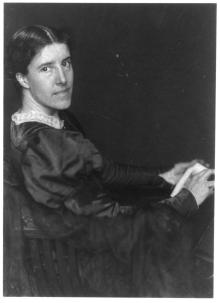
Women Do Not Want It
When the woman suffrage argument first stood upon its legs,
They answered it with cabbages, they answered it with eggs,
They answered it with ridicule, they answered it with scorn,
They thought it a monstrosity that should not have been born.
When the woman suffrage argument grew vigorous and wise,
And was not to be answered by these opposite replies,
They turned their opposition into reasoning severe
Upon the limitations of our God-appointed sphere.
We were told of disabilities–a long array of these,
Till one could think that womanhood was merely a disease;
And “the maternal sacrifice” was added to the plan
Of the various sacrifices we have always made–to man.
Religionists and scientists, in amity and bliss,
However else they disagreed, could all agree on this,
And the gist of all their discourse, when you got down in it,
Was–we could not have the ballot because we were not fit!
They would not hear the reason, they would not fairly yield,
They would not own their arguments were beaten in the field;
But time passed on, and someway, we need not ask them how,
Whatever ails those arguments–we do not hear them now!
You may talk of suffrage now with an educated man,
And he agrees with all you say, as sweetly as he can:
‘T would be better for us all, of course, if womanhood was free;
But “the women do not want it”–and so it must not be!
‘T is such a tender thoughtfulness! So exquisite a care!
Not to pile on our frail shoulders what we do not wish to bear!
But, oh, most generous brother! Let us look a little more–
Have we women always wanted what you gave to us before?
Did we ask for veils and harems in the Oriental races?
Did we beseech to be “unclean,” shut out of sacred places?
Did we beg for scolding bridles and ducking stools to come?
And clamour for the beating stick no thicker than your thumb?
Did we ask to be forbidden from all the trades that pay?
Did we claim the lower wages for a man’s full work today?
Have we petitioned for the laws wherein our shame is shown:
That not a woman’s child–nor her own body–is her own?
What women want has never been a strongly acting cause,
When woman has been wronged by man in churches, customs, laws;
Why should he find this preference so largely in his way,
When he himself admits the right of what we ask today?
Charlotte Perkins Gilman
(1860-1935)
Women Do Not Want It
Suffrage Songs and Verses
• fleursdumal.nl magazine
More in: #Editors Choice Archiv, Archive O-P, Archive O-P, Feminism, The Ideal Woman
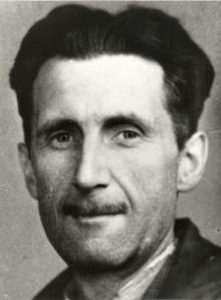
The Pagan
So here are you, and here am I,
Where we may thank our gods to be;
Above the earth, beneath the sky,
Naked souls alive and free.
The autumn wind goes rustling by
And stirs the stubble at our feet;
Out of the west it whispering blows,
Stops to caress and onward goes,
Bringing its earthy odours sweet.
See with what pride the the setting sun
Kinglike in gold and purple dies,
And like a robe of rainbow spun
Tinges the earth with shades divine.
That mystic light is in your eyes
And ever in your heart will shine.
George Orwell
(1903 – 1950)
The Pagan
• fleursdumal.nl magazine
More in: Archive O-P, Archive O-P, George Orwell, Orwell, George
Award-winning poet Maya C. Popa suggests that our restless desires are inseparable from our mortality in this pressing and precise collection.
 Rooting out profound meaning in language to wrench us from the moorings of the familiar and into the realm of the extraordinary, the volume asks, how do we articulate what’s by definition inarticulable? Where does sight end and imagination begin?
Rooting out profound meaning in language to wrench us from the moorings of the familiar and into the realm of the extraordinary, the volume asks, how do we articulate what’s by definition inarticulable? Where does sight end and imagination begin?
Lucid and musically rich, these poems sound an appeal to a dwindling natural world and summon moments from the lives of literary forbearers—John Milton’s visit to Galileo, a vase broken by Marcel Proust—to unveil fresh wonder in the unlikely meetings of the past. Popa dramatizes the difficulties of loving a world that is at once rich with beauty and full of opportunities for grief, and reveals that the natural arc of wonder, from astonishment to reflection, more deeply connects us with our humanity.
Maya C. Popa is the author of American Faith, recipient of the 2020 North American Book Prize. Her poems have appeared in the Nation, Poetry, and the Paris Review, among other publications. She lives in New York City.
Wound Is the Origin of Wonder
by Maya C. Popa
Publisher: W. W. Norton & Company (November 8, 2022)
Language: English
Hardcover: 96 pages
ISBN-10: 1324021365
ISBN-13: 978-1324021360
Price $26.95
• fleursdumal.nl magazine
More in: #Editors Choice Archiv, - Book News, Archive O-P, Archive O-P
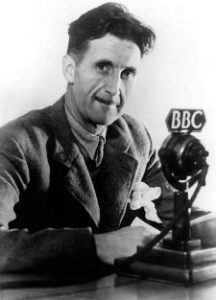
Awake! Young Men of England
OH! give me the strength of the Lion,
The wisdom of reynard the Fox
And then I’ll hurl troops at the Germans
And give them the hardest of knocks.
Oh! think of the War Lord’s mailed fist,
That is striking at England today:
And think of the lives that our soldiers
Are fearlessly throwing away.
Awake! Oh you young men of England,
For if, when your Country’s in need,
You do not enlist by the thousand,
You truly are cowards indeed.
George Orwell
(1903 – 1950)
Awake! Young Men of England
• fleursdumal.nl magazine
More in: Archive O-P, Archive O-P, George Orwell, Orwell, George
Widely considered to be among the most important Italian poets of the twentieth century, Sandro Penna was born and raised in Perugia but spent most of his life in Rome.
 Openly gay, Penna wrote verses celebrating homosexual love with lyrical elegance.
Openly gay, Penna wrote verses celebrating homosexual love with lyrical elegance.
His writing alternates between whimsy and melancholia, but it is always full of light.
Juggling traditional Italian prosody and subject matter with their gritty urban opposites in taut, highly concentrated poems, Penna’s lyrics revel in love and the eruption of Eros together with the extraordinary that can be found within simple everyday life.
There is something ancient in Penna’s poetry, and something Etruscan or Greek about the poems, though the landscape is most often of Rome: sensual yet severe, sinuous yet solid, inscrutable, intangible and languorous, with a Sphinx-like and sun-soaked smile.
Penna’s city is eternal—a mythically decadent Rome that brings to mind Paris or Alexandria. And though the echoes resound—from Rimbaud, Verlaine, Baudelaire to Leopardi, D’Annunzio, Cavafy—the voice is always undeniably and wonderfully Penna’s own.
Sandro Penna (1906–77) was an Italian poet. During his life, he was awarded two of Italy’s most important literary awards, the Premio Viareggio and the Premio Bagutta. His work has been translated into many languages, including English, French, German, Japanese, and Spanish, and has appeared in numerous anthologies of Italian poetry.
Alexander Booth is a writer and translator and the recipient of a 2012 PEN Translation Fund grant for his translations of Lutz Seiler.
Sandro Penna
Within the Sweet Noise of Life
Selected Poems
Translated by Alexander Booth
ISBN: 9780857427878
Format: Hardback
Pages: 96
Rights: UCP
Publication Year: March 2021
Size: 5″ x 8.5″
Publisher: Seagull Books
$19.00
• fleursdumal.nl magazine
More in: #Editors Choice Archiv, - Book News, Archive O-P, Archive O-P, LGBT+ (lhbt+)

A Little Poem
A happy vicar I might have been
Two hundred years ago
To preach upon eternal doom
And watch my walnuts grow;
But born, alas, in an evil time,
I missed that pleasant haven,
For the hair has grown on my upper lip
And the clergy are all clean-shaven.
And later still the times were good,
We were so easy to please,
We rocked our troubled thoughts to sleep
On the bosoms of the trees.
All ignorant we dared to own
The joys we now dissemble;
The greenfinch on the apple bough
Could make my enemies tremble.
But girl’s bellies and apricots,
Roach in a shaded stream,
Horses, ducks in flight at dawn,
All these are a dream.
It is forbidden to dream again;
We maim our joys or hide them:
Horses are made of chromium steel
And little fat men shall ride them.
I am the worm who never turned,
The eunuch without a harem;
Between the priest and the commissar
I walk like Eugene Aram;
And the commissar is telling my fortune
While the radio plays,
But the priest has promised an Austin Seven,
For Duggie always pays.
I dreamt I dwelt in marble halls,
And woke to find it true;
I wasn’t born for an age like this;
Was Smith? Was Jones? Were you?
George Orwell
(1903 – 1950)
A Little Poem
• fleursdumal.nl magazine
More in: Archive O-P, Archive O-P, AUDIO, CINEMA, RADIO & TV, Orwell, George

Poem from Burma
Brush your teeth up and down, brother,
Oh, brush them up and down!
All the folks in London Town
Brush their teeth right up and down,
Oh! How they shine!
Aren’t they bloody fine?
Night and morning, my brother,
Oh brush them up and down!”
George Orwell
(1903 – 1950)
Poem from Burma
• fleursdumal.nl magazine
More in: Archive O-P, Archive O-P, George Orwell, Orwell, George

Summer-Like
Summer-like for an instant the autumn sun bursts out,
And the light through the turning elms is green and clear;
It slants down the path and ragged marigolds glow
Fiery again, last flames of the dying year.
A blue-tit darts with a flash of wings, to feed
Where the coconut hangs on the pear tree over the well;
He digs at the meat like a tiny pickaxe tapping
With his needle-sharp beak as he clings to the swinging shell.
Then he runs up the trunk, sure-footed and sleek like a mouse,
And perches to sun himself; all his body and brain
Exult in the sudden sunlight, gladly believing
That the cold is over and summer is here again.
But I see the umber clouds that drive for the sun,
And a sorrow no argument ever can make away
Goes through my heart as I think of the nearing winter,
And the transient light that gleams like the ghost of May;
And the bird unaware, blessing the summer eternal,
Joyfully labouring, proud in his strength, gay-plumed,
Unaware of the hawk and the snow and the frost-bound nights,
And of his death foredoomed.
George Orwell
(1903 – 1950)
Summer-Like
• fleursdumal.nl magazine
More in: 4SEASONS#Summer, Archive O-P, Archive O-P, George Orwell, Orwell, George
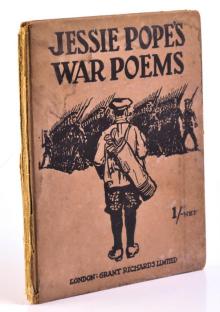
Love In A Mist
Beneath an Ilfracombe machine,
While thunderstorms were raging,
Strephon and Chloe found the scene
Exceedingly engaging;
Though Mother Earth reproached the skies
With flinging pailfuls at her,
When Strephon looked in Chloe’s eyes
The weather didn’t matter.
When ‘Arry up on ‘Ampstead ‘Eath
Performed a double shuffle,
The rain above, the mud beneath,
His spirits failed to ruffle;
For ‘Arriet was by his side
In maddened mazes whirling
And little cared his promised bride
To see her plumes uncurling.
For one resplendent Summer morn
Young Edwin fondly waited,
Till Angelina grew forlorn
And quite emaciated.
When Hampton Court was like a sponge,
With mists their way beguiling,
He seized her hand and took the plunge,
And came up wet and smiling.
Jessie Pope
(1868 – 1941)
Love In A Mist
From: War Poems
• fleursdumal.nl magazine
More in: *War Poetry Archive, Archive O-P, Pope, Jessie, WAR & PEACE
Thank you for reading Fleurs du Mal - magazine for art & literature